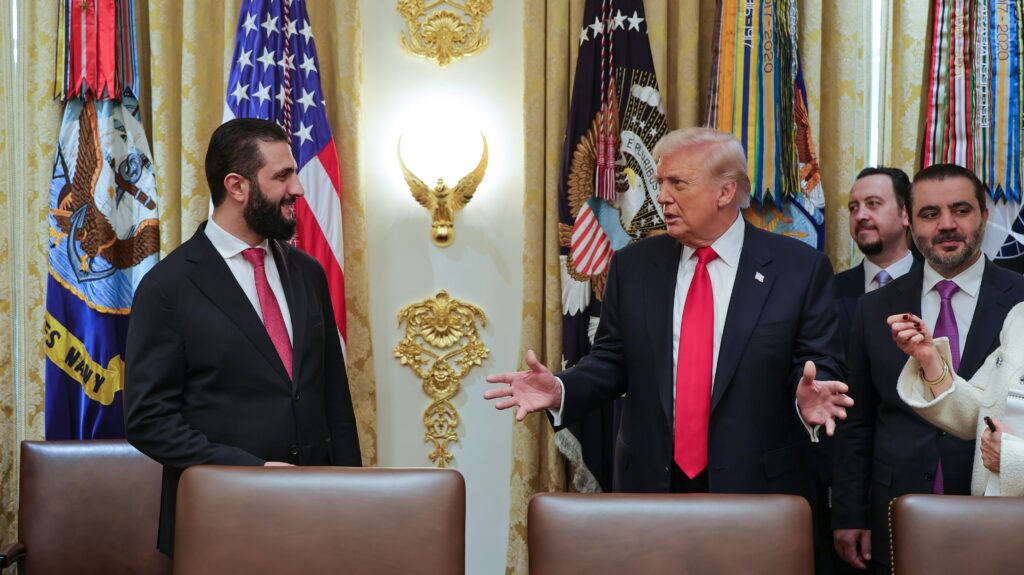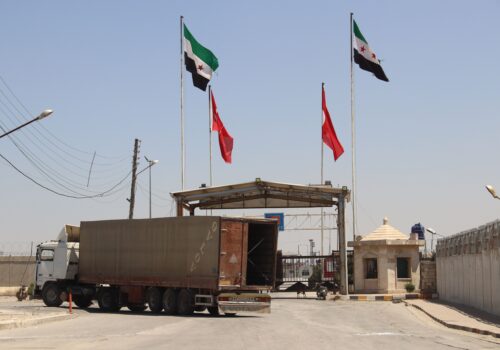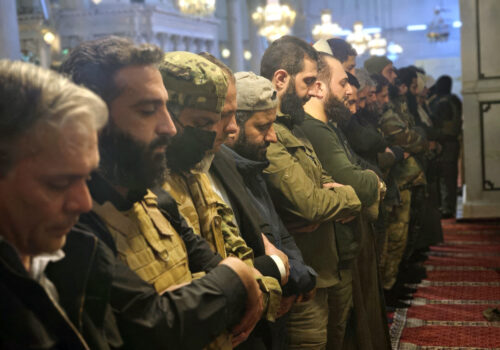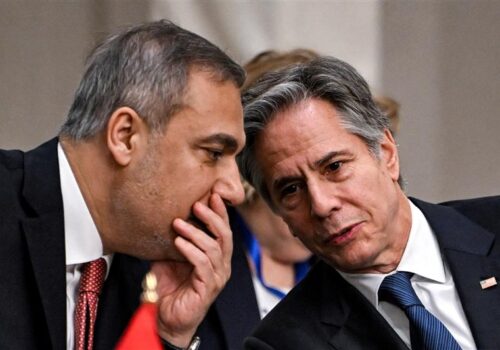Two trips to Washington last week revealed a great deal about what to expect in the Middle East through the rest of the Trump presidency—and produced some visuals virtually unimaginable just a year ago. The first was the visit of interim Syrian President Ahmed al-Sharaa, which featured a basketball shootaround with US military members and bonhomie with President Donald Trump in the Oval Office. The second was Turkish Foreign Minister Hakan Fidan’s drop-by at the al-Sharaa meeting and subsequent tripartite meeting with Secretary of State Marco Rubio and Syrian Foreign Minister Asaad al-Shaibani at the State Department.
Taken together, the trips, the visuals, and the massive investment of political capital that they represent for the Trump administration clearly signal that Syria is one of Trump’s top foreign policy priorities, that there is no alternative to al-Sharaa, and that Washington is not daunted by the likelihood of a long stabilization process with a significant price tag—as long as regional allies are doing much of the heavy lifting.
In October 2024 Trump had not yet been re-elected, Bashar al-Assad still ruled Damascus, al-Sharaa was on US terror lists, and US-Turkish relations remained stubbornly chilly. Thirteen months later, the new government in Damascus has arguably become the central focus of Trump’s Middle East policy, and Turkish partnership so central to that effort that President Recep Tayyip Erdoğan’s right-hand man was in the room for Syria’s momentous Oval Office meeting.
The al-Sharaa element may be the most jarring. Much of Washington remains deeply skeptical of al-Sharaa’s intentions and ability to rein in extremism in his country, despite energetic and sustained support for sanctions relief and full engagement from the Trump administration. This is understandable given al-Sharaa’s past record of fighting against Western troops in Iraq and later helping al-Qaeda expand into Syria. But Westerners including former CIA Director David Petraeus had sensed a decade ago that al-Sharaa and his organization, Hayat Tahrir al-Sham (HTS), were candidates for moderating and evolving into a force compatible with Western interests.
After breaking from and later targeting both al-Qaeda and the Islamic State, HTS refocused its mission on representing all Sunnis in Syria and, since November 2024, all Syrians in a growing embrace of inclusivity and moderation. The Trump administration has taken the rhetorical and aspirational change as both substantive and likely to succeed. It has shown this by embracing the interim president of Syria in a high-profile manner—welcoming al-Sharaa to New York in September and Washington in November—that would have been almost inconceivable under any other US president.
Fidan’s visit and trilateral working meeting with his Syrian and American counterparts was equally remarkable. Fidan’s working relationship with Rubio’s predecessor, Antony Blinken, was cordial but focused more on mutual grievances than opportunities and reflected the process-heavy, results-challenged approach that marked Biden administration foreign policy more broadly. And Fidan’s predecessor, Mevlut Cavusoglu, had a fairly acrimonious relationship with Mike Pompeo, secretary of state during Trump’s first term in office. To see Rubio and Fidan working with their Syrian counterpart on details to keep a key Trump foreign policy initiative—stability in Syria—on track indicates a level of coordination and trust absent heretofore in the twenty-first century.
The hands that tied these two trips together belong to a man who appeared in some press photos but received scant mention otherwise—Ambassador to Turkey and Special Envoy to Syria Tom Barrack. Barrack sees Turkey as critical to regional stability in multiple directions and Syria as critical to the security of both Israel and Turkey. Writing after the twin visits, Barrack assessed the results as potentially transformative on a range of US interests: peace in Gaza, Turco-Israeli rapprochement, containing Iran, and suppressing the Islamic State and other terror groups. Trump and Rubio have invested enough political capital in this embrace of Damascus and Ankara that it is clear Barrack has made the case for it convincingly. It also bears mention that Barrack’s close and supportive relationship with US Central Command chief Admiral Brad Cooper has amplified the voice and views of both men in Washington—they are the backstory of the dramatic changes reflected in last week’s visits. Such comity has not always pertained between senior Pentagon and State Department officials on the Syria file in the past.
What do the visits portend for the rest of the second Trump administration?
First, Syria will remain a top foreign policy priority for Trump, Rubio, Barrack, Cooper, the Senate Foreign Relations Committee, and others in Washington. It is the lynchpin of Trump’s Middle East approach: success there will have implications on the portfolios of regional counter-terrorism, security of Israel, countering Iranian militias, progress in Gaza, regional trade and development, and associated humanitarian concerns in Syria and surrounding countries.
Second, “there is no Plan B” to al-Sharaa—neither actively deconstructing Syria nor leaving it to its own devices is workable—and his survival will require continued close coordination with the Turks.
Third, after the headlines fade, an enormous amount of negotiation, business development, advisory efforts, investment, and deconfliction will be required for at least the rest of Trump’s term. Whether Washington has the patience to continue leading efforts with the degree of energy and salience seen in recent months remains an open question, especially with US midterm elections less than a year away. But at the end of a remarkable week, it may suffice to know that the path is open if the will is present.
Rich Outzen is a geopolitical consultant and nonresident senior fellow at the Atlantic Council Turkey Program with thirty-two years of government service both in uniform and as a civilian.
The views expressed in TURKEYSource are solely those of the authors and do not necessarily reflect the views of the Atlantic Council, its staff, or its supporters.
Further reading
Wed, Sep 24, 2025
Is a new era of Turkey-Syria economic engagement on the horizon?
MENASource By
The convergence of Turkey's and the Gulf's economic strategies in Syria presents an opportunity for Washington.
Tue, Dec 10, 2024
A blueprint for bringing about a new Syria
New Atlanticist By Kirsten Fontenrose
For a reconstruction strategy in Syria to be effective, all parties must adopt a unified approach that is clear-eyed about the country’s new leaders.
Mon, Jan 6, 2025
Assad’s fall has created an opportunity for US-Turkey cooperation
TURKEYSource By Rich Outzen
Long a point of discord between Washington and Ankara, developments in Syria present an opportunity to return to cooperation.
Image: Syria President Ahmed Al-Sharaa is received by U.S President Donald Trump at the White House on an official visit to the United States of America on Monday Nov 10, 2025. (Syrian Presidential Press Office handout) EYEPRESS via Reuters Connect.



